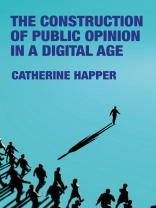This book presents a new conceptual model for understanding the role of the media in the construction of public knowledge, belief and opinion in the context of a radically changed communications infrastructure. Drawing on a series of empirical studies conducted over nearly a decade, Happer deploys evidence of a ‘disconnect’ between neoliberal media and the public which is rooted in a disaffection with a mainstream political culture which has failed to deliver the societal outcomes promised. As people are pushed towards alternative digital sources, new communities of opinion are produced in ways which polarise publics and ultimately limit the potential for social change.
Offering an innovative and urgently needed new sociological analysis, this book is required reading for an inter-disciplinary field of media, journalism, and politics/IR which has largely abandoned questions of media power and public opinion management, as well as policymakers, science communicators and journalists.
Key points of the book:
1) public opinion formation and why people may come to different positions through the development of a new model
2) the societal outcomes produced when a widespread disconnect between journalism and public opinion emerges
3) the atomisation of opinion and its relations to newly constructed opinion communities (with consideration of the role of class)
4) the turn to digitally available alternatives which enable new, less visible power agents to exert control.
Spis treści
Introduction
1 The disconnect: mis-managing public trust
2 Filtering for opinion: a new conceptual model
3 Class, education and media cultures: ‘them’ versus ‘us’
4 The new gatekeepers of digital content and opinion
5 Climate, COVID and the cost of living: getting up close to global crises
Conclusion
Appendix: Empirical studies and datasets 2011-2020
Bibliography
Index
O autorze
Catherine Happer is Senior Lecturer in Sociology at the University of Glasgow and Director of the Glasgow University Media Group.












